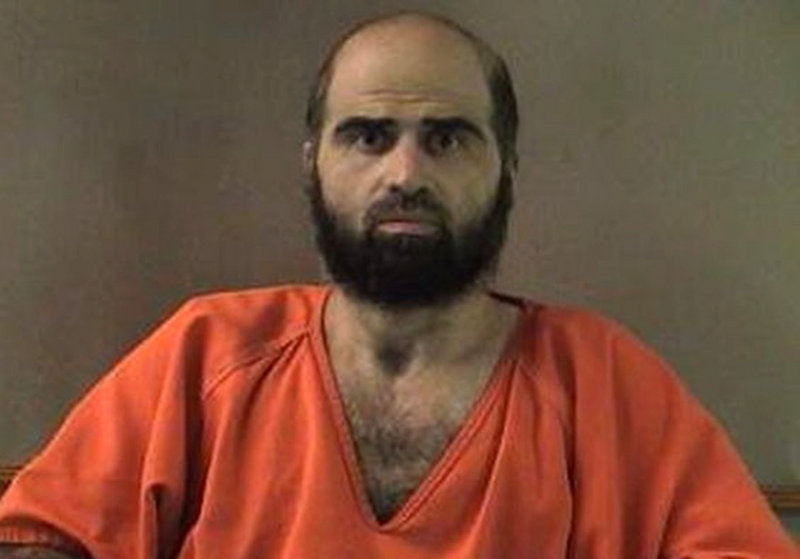FORT HOOD, Texas – In the more than three years since the shooting rampage at Fort Hood, military judges have had to weigh one delicate issue after another as authorities prepare to try Maj. Nidal Malik Hasan on charges of killing 13 and wounding 32 at the military base. Should Hasan, a Muslim, be allowed to wear a beard? Should Hasan be allowed to plead guilty?
On Monday, a judge will take up another question with far-reaching implications: Should the Army psychiatrist be allowed to represent himself in the capital case?
One issue before the court will be whether Hasan, 42, who was shot and paralyzed from the chest down in the attack, would be physically able to represent himself.
It was not clear how or when the military judge handling the case, Col. Tara Abbey Osborn, intends to rule on Hasan’s request.
She has said a psychiatric evaluation found Hasan mentally capable of defending himself, but she questioned whether he was physically capable, said Fort Hood spokesman Tyler Broadway. Hasan’s defense lawyers told the judge that their client was unable to sit for long periods and would not be able to participate in the courtroom for more than five hours a day.
Either way the judge rules, military legal experts said, she risks opening the door for future appeals.
“The question is: Is he physically able to conduct his defense? Assuming he is, I don’t think the judge has any choice but to allow him to represent himself,” said Richard Rosen, a retired colonel and law professor at Texas Tech University School of Law in Lubbock.
Should Osborn allow Hasan to defend himself, Rosen said, he expects she will also appoint standby counsel to advise Hasan during the trial, possibly his current attorneys, “because one thing she doesn’t want to do is provide an error that would overturn the case on appeal,” allowing Hasan to claim he suffered from ineffective assistance of counsel — himself.
Rosen said allowing Hasan to defend himself shouldn’t delay the trial initially, but it could pose problems if Hasan chooses to ignore military legal rules and instead seize the opportunity to pontificate.
Hasan has already tried to plead guilty, which judges have denied (under military law, defendants in capital cases cannot plead guilty). But should Hasan defend himself, “he might just blurt out that he’s guilty” during cross examination or testimony, Rosen said, although standby counsel would advise against it.
“I’m afraid he’ll try to make a show trial out of it,” Rosen said.
An attorney representing many Fort Hood victims and their families in a related federal suit said they were frustrated by the protracted trial — the shooting occurred in November 2009 — and worried about their safety should Hasan be allowed to represent himself.
“Our clients are concerned that this will lead to even more delay,” said Reed Rubinstein, a partner at Washington-based Dinsmore & Shohl.
“They are concerned that Hasan acting as his own counsel will have access to information about them, and there has been no explanation or discussion with them” about what he could do with the information or whether he would be able to share it with others, Rubinstein said.
Rubinstein is representing 125 victims and relatives who last fall sued Army Secretary John McHugh, the defense secretary, FBI director and other officials in federal court, alleging they knew Hasan was a radical extremist before the shooting but tried to obscure the truth, classifying the attack as workplace violence instead of terrorism and effectively denying them benefits and other assistance.
Alonzo Lunsford, 46, one of the shooting victims who sued and was also subpoenaed to testify at the court-martial, said he dreaded the thought of being cross-examined by Hasan.
“The hardest part will be sitting on the stand and having this man question me, not reacting to this man who tried to kill me,” said Lunsford.
Lunsford, a retired Army staff sergeant in Lillington, N.C., was shot seven times during the attack, once in the head, and still has a bullet lodged in his back.
The military judge has worked to expedite Hasan’s court-martial, which under a previous judge had been dogged by delays, including Hasan’s refusal to shave his beard because of his religious beliefs.
Jury selection in the case is scheduled to start Wednesday, with trial testimony beginning in July.
Send questions/comments to the editors.



Success. Please wait for the page to reload. If the page does not reload within 5 seconds, please refresh the page.
Enter your email and password to access comments.
Hi, to comment on stories you must . This profile is in addition to your subscription and website login.
Already have a commenting profile? .
Invalid username/password.
Please check your email to confirm and complete your registration.
Only subscribers are eligible to post comments. Please subscribe or login first for digital access. Here’s why.
Use the form below to reset your password. When you've submitted your account email, we will send an email with a reset code.